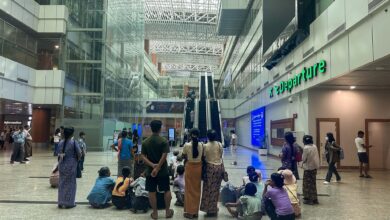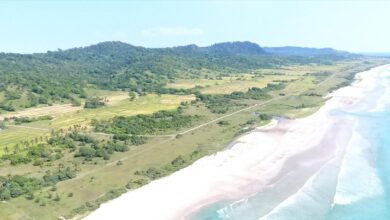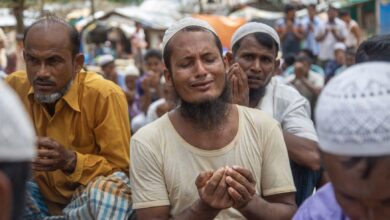
Two years into its attempt to crush the anti-coup resistance, the junta has been recruiting unemployed and undereducated young people from among military and police families into its armed forces in an attempt to bolster troop numbers, Myanmar Now has learned.
These newcomers have typically been stationed as security guards for existing battalions and outside junta administrative departments, provided with meals and a uniform, and paid daily wages of 10,000 kyat (US$4.77).
However, that is changing, inside sources said, noting that in 2022, new recruits were assigned both to work in the junta’s governance infrastructure and as frontline soldiers.
In a meeting of the National Defence and Security Council in the regime capital of Naypyitaw on January 31, junta chief Min Aung Hlaing admitted that nearly half of Myanmar’s 330 townships were no longer under the full control of the military.
It has previously been said that a major challenge facing the Myanmar army—in addition to rising casualties—is increasing desertion by its troops, particularly to join the anti-junta Civil Disobedience Movement (CDM). Once thought to have between 200,000 and 300,000 soldiers, the current troop numbers in the regime’s armed forces are not known.
The military has also reportedly been struggling to supplement its troops with members of the police force, as they too have been major targets of anti-regime guerrilla groups. In resistance strongholds such as Magway and Sagaing regions, they have been reinforcing their presence with the presence of militias known as Pyu Saw Htee—trained, armed and backed by the regime.
“The military council will use any method to strengthen their army in this state of despair,” a former army captain involved in the CDM told Myanmar Now.

Although members of military-affiliated families are not forcibly recruited into the army, they have been increasingly persuaded to join, according to a woman who belongs to one such household in Naypyitaw, noting that those with financial difficulties are typically targeted.
“We know which families are doing all right and which families are struggling, since we all live together in military housing,” she said. “They come to the houses of the families that have money troubles and encourage them to join the army… So they ask their children to join the army for a monthly salary of 300,000 kyat ($143).”
She noted that from her base alone, around 20 unemployed high school graduates were recruited to take up positions left vacant by striking civil servants, and young men who had not finished their secondary education were assigned to security details.
Members of military families were previously given weekly security and cleaning duties within the bases around the country where they were stationed. However, in the aftermath of the February 2021 coup, they were recruited as paid troops and deployed to rural and conflict-torn areas, a 65-year-old veteran told Myanmar Now.
“They were told they had to join the frontline, if necessary,” he added, noting that he, like other retirees, had been asked to rejoin the service again for this purpose. He declined.
“They join for various reasons: the economy is bad, and finding a job is difficult,” he continued. “The father, who may be a veteran, is too weak… so his son will accompany him into the army.”
Another retired soldier who served in the army for 40 years told Myanmar Now that among these new recruits, the reasons for joining were often rooted in pragmatism over patriotism.
“No one has joined the army because they love the country,” he said.
Once provided with uniforms, weapons, and two weeks of combat training, family members of troops are often sent to reinforce weakened battalions and brigades nationwide, according to Cpt Zin Yaw, who left the Myanmar army after nearly 20 years to join the Civil Disobedience Movement.
“The new recruits are often underage and not in a good mental state,” he said, citing sources still in the military. “They were kept at the base just for show. Some were so unstable that they couldn’t be trusted enough to have their guns loaded with real bullets.”
He noted that this information came from an officer currently serving in the Southeastern Regional Command, active in Mon and Karen states, where intense fighting has taken place between the Myanmar army and resistance forces including the longstanding ethnic armed organisation the Karen National Union (KNU).

Children among troops
A former child soldier forcibly recruited into the military while on a Buddhist pilgrimage in 2019 affirmed that the Myanmar army resorted to unorthodox measures to bolster its troop numbers well before the coup.
Hein Zaw Oo said he was 16 and had just visited the Kyaiktiyo Pagoda in Mon State when he was approached by a police officer he met on the train back to his native Yangon. The officer convinced him to enlist, and initially sent him to Infantry Battalion 30 in Bago Region’s Taungoo Township. He then attended six months of combat training in Thabeikkyin Township in Mandalay.
“There were many underage children among the troops,” he recalled. “Many of them were younger than me.”
Speaking to Myanmar Now on the condition of anonymity, another army captain who served for 10 years before joining the CDM said that Hein Zaw Oo’s experience was not uncommon, and that railway stations had long been known military recruitment sites, particularly for minors.
“They target the boys who seem lost at the stations—naïve young boys are threatened and recruited into the army,” the captain said. “For example, they will accuse the boys of stealing, and after beating them, they will threaten them with prison if they don’t join [the army].”

Officers were under pressure to find two new recruits each month in order to secure their own promotions, he explained. Prior to the coup, they could expect to spend up to 2m kyat (nearly US$1,000) in “fees” to take credit for bringing on a new soldier.
“Some bases sell their troops’ recruitment records to those officers. The military recruitment units also sell the names of the people they have recruited, and the officers [who want a promotion] will buy from them,” he explained.
After he completed his training, teenager Hein Zaw Oo became a member of Light Infantry Battalion 2 under Light Infantry Division 44, and was—perhaps ironically—stationed in the Kyaikhto, the same township as the holy site he visited before he was recruited.
He was then deployed to Rakhine State to fight against the Arakan Army in 2020, and transferred across the country to Karen State one year after the coup. Looking for an escape, he contacted the Cobra Column—a combined force made up of KNU soldiers and members of the anti-junta People’s Defence Force—as they advanced along the highway connecting Myawaddy with Waw Lay along the Thai border in May 2022, and defected to the resistance.
Upon his arrival in liberated territory, Hein Zaw Oo told Myanmar Now that the “propaganda” spread by the military about the anti-junta armed groups turned out to be false.
“The army says that deserters who join the CDM will be killed by [the resistance forces] after being fed for a day or two,” he explained, speculating that the regime is desperate not to lose more troops to the movement it is struggling to suppress.



